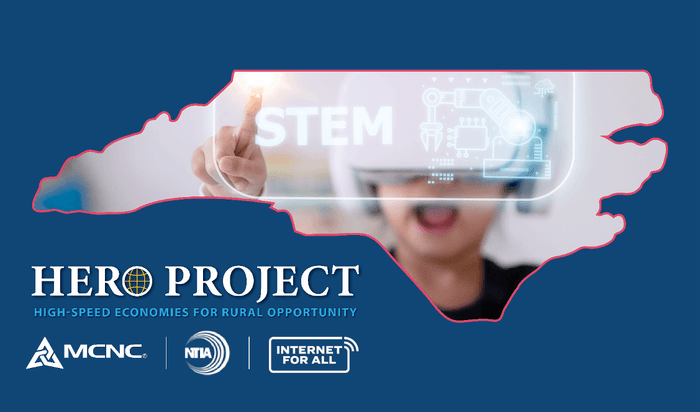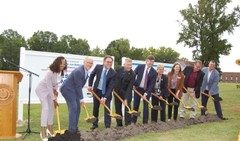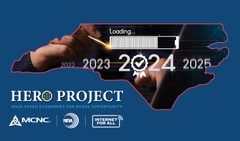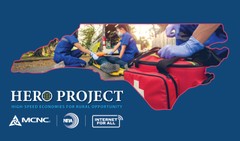HERO Project: STEM is North Carolina’s secret sauce; connectivity is a main ingredient

Broadband is a powerful tool that can transform education by providing students with greater access to information and resources, fostering innovative teaching methods, and promoting learning opportunities. MCNC understands that high-speed internet is pivotal to equitably educating North Carolina citizens, and MCNC’s HERO (High Speed Economies for Rural Opportunities) Project aims to ensure every community in the state has what it needs to succeed.
Technology has been the driving force of North Carolina’s economy for the last 50 years, and it will continue to be for the next 50. In order for the state to remain competitive, it must lead in the number of STEM (science, technology, engineering, and mathematics) graduates. These graduates are the fuel to the economic engine and innovation backbone in our state. They are and will be the cure to cancer, the solution to alternative energy sources, discoverers of new vistas in space, saviors of our environment, and inventors of the technologies that define our lives now and for generations to come.
North Carolina School Connectivity Initiative (SCI)
The N.C. School Connectivity Initiative (SCI) launched with the publication of the Developing Regional Education Networks report in 2006. A year later, the N.C. General Assembly through Senate Bill 1741 established the SCI, and by 2009 all 115 K-12 school districts in North Carolina were connected to MCNC’s network. The SCI was a collaboration of the Friday Institute for Educational Innovation at N.C. State University, N.C. Department of Public Instruction, N.C. Office of Information Technology Services and MCNC to create21st century classrooms that develop a North Carolina workforce prepared to succeed in a global economy. MCNC has lead responsibility for providing two of the four critical areas of the SCI: Broadband Connectivity and Client Network Engineering.
North Carolina has been recognized as a national leader in providing equitable connectivity for public schools. The SCI provides sufficient and reliable internet access to every classroom across the state and provides all Public-School Units (PSUs) with cooperative purchasing agreements, training, support, network engineering, content filtering, identity management and firewall services. North Carolina also utilizes the Federal Communications Commission's E-rate Program to the fullest extent possible and is a leading recipient of funding on a per-student basis.
The SCI also continues to encourage innovative teaching and learning, which has seen increased collaboration between university educators and K-12 and helped fuel economic development activities in underserved parts of the state. The SCI essentially put everything education on one network backbone – this allowed MCNC to facilitate the sharing of curricular content across the K-20 spectrum, the development of virtual professional learning communities among instructors, academic leaders and technical support personnel, and the creation of data sets that can track a student’s achievement in order to personalize the learning experience based on real‐time data.
The success of the SCI is unmistakable, with enhanced fiber services and improved educational outcomes documented in virtually every county in North Carolina. Read case study.
NC STEM Community Collaborative
The North Carolina STEM Community Collaborative, now known as the NC STEM Center, was incubated out of MCNC beginning in 2007. Funded initially through MCNC, the Bill & Melinda Gates Foundation and other community partners, this statewide effort recognized that community collaboration would be the lever to ensure sustainable innovation in STEM education. In 2012, this effort transitioned to the N.C. Science, Mathematics and Technology (SMT) Education Center. The name also eventually shortened to the NC STEM Center, which today still serves and supports successful 21st century teaching and learning in North Carolina and recognizes the importance of engaging students in digital-age learning that prepares them to be ready to enter the workforce.
MCNC continues to be a strategic supporter of this work to ensure all students have the opportunity to engage in rigorous, sustainable STEM education that provides them with good choices in life and bolsters the economic strength of their communities. MCNC has a long history of incubating efforts and transitioning them at the right time and saw many accomplishments from this program including the design of the state’s initial STEM Scorecard, providing input on the state’s STEM Plan and Race to the Top grants, raising awareness on the critical need of having a prepared 21st century workforce, and helping create a community design process to help scale "ready to launch" and "emerging" communities throughout North Carolina – which today sees local, grassroots organizations doing good work in key regions like the NC EAST Alliance and STEM West.
Economic Impacts of STEM and Connectivity
Although the state has made massive progress over the last 15 years, teaching and learning environments still continue to be inequitable and disconnected in many areas – the pandemic further exposed the digital and homework gaps in the state. The nature of today’s globalized workforce and the needs of our industries have changed and require an understanding of scientific and mathematical principles, a working knowledge of computer hardware and software, and the problem-solving skills developed by courses in STEM. Nearly every career field is being reshaped this way right now, and those students who know how to use it are going to have a tremendous advantage.
North Carolina's economic future is tied to having a STEM-educated workforce. Broadband can help bridge the gap in STEM education between urban and rural areas, or between well-funded and under-funded schools. With high-speed internet, students in all locations can have access to the same quality of educational resources – MCNC works everyday to provide this level of connectivity and access, enabling students despite their zip code to learn the necessary skills they need to be competitive. It also produces technologically-proficient workers who are capable of dealing with the demands of a high-tech workforce as well as scientifically-literate voters and citizens who make intelligent decisions about public policy and understand the world around them.
There continues to be a strong link between high-quality STEM education and economic development. The future of the state’s economy is knowledge based, and that begins with STEM. Investing in broadband infrastructure is an investment in the future, and there are still many areas of the state where citizens do not have access to it. MCNC’s HERO Project is another step forward to keep our students from falling behind or being forgotten.
Construction is expected to begin this summer with completion planned for June 2025.




















